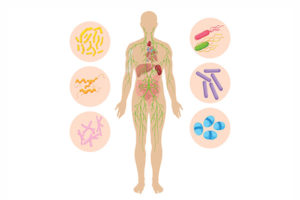Fast and adaptable
Researchers at FAU identify the molecular mechanisms involved in the activation of the immune system
Dendritic cells regulate the immune system, attack viruses and bacteria and prevent unwanted and harmful immune system reactions. There are many different sub-species of dendritic cells. To date, however, it has been unclear how these various sub-species initiate immune system responses.But now researchers at Faculties of Medicine and Sciences have found an answer to this puzzle. It is hoped that the results will contribute towards the development of improved strategies for treating infections, as well as a specific immunotherapy for cancer. The corresponding findings have been recently published in the Journal of Experimental Medicine .
Branched sentry posts
The immune system can be sub-divided into the innate and adaptive immune system. Whilst the innate immune system reacts immediately to foreign intruders like viruses and bacteria, the adaptive immune system is capable of continually adjusting itself throughout the lifespan of an individual so that it can deal with various new pathogens. It can recognize specific antigens on the surface of invaders, and is thus able to trigger targeted, effective and prolonged defense mechanisms. It is here that dendritic cells play a role. With their branched projections, this highly varied group of cells look like trees (‘dendron’ [δένδρον] is Greek for ‘tree’). One of their tasks is to guard the surfaces of body tissues. On contact with a foreign invader, they obtain information from it, convert this information into antigens, migrate to the nearest lymph nodes and activate the T cells by presenting these antigens to them.
The right response every time
A team of scientists, led by Prof. Dr. Diana Dudziak, Professor of Dendritic Cell Biology, Dr. Christian Lehman, Head of the Dendritic Cell Biology Laboratory, and Prof. Dr. Falk Nimmerjahn of the Division of Genetics, have undertaken a study to investigate how the various Fc receptors on dendritic cells contribute towards initiating the immune response. The researchers examined these cells in the presence of pathological disorders (such as inflammation) as well as under physiological conditions. They found that the differences between the various sub-species of dendritic cells were associated with different responses by cytotoxic and helper T cells.
Both types of cells are part of the white blood cell family and of the adaptive immune system. However, it has been assumed to date that helper T cells have a support function only and that they activate macrophages and B lymphocytes, causing the latter to produce antibodies, while cytotoxic T cells recognize the specific antigens on virus-infected cells and tumor cells and directly combat these.
Particularly interesting when it comes to new ways to fight cancer
The main aim of immunological cancer treatment is to target tumors using cytotoxic T cells.
But the latest research findings indicate that helper T cells are also involved in the fight against cancer.
explains Prof. Dr. D. Dudziak. That is why, she adds, it was very interesting to discover that one of the Fc receptors loaded with antigens can simultaneously trigger cytotoxic and helper T cell immune responses.
In the light of other recently published data, our results suggest the way forward is to develop new strategies that will generate enhanced immune responses.
Further information
Prof. Dr. Diana Dudziak
Phone.: +49 9131 8539346
